ABRAHAM’S RESPONSE
In verse 1 we read: “Now the LORD had said unto Abram.”
We know from other Scriptures that God had called Abram when he lived in Ur of the Chaldees:
“The God of glory appeared unto our father Abraham, when he was in Mesopotamia, before he dwelt in Charran, and said unto him, Get thee out of thy country, and from thy kindred, and come into the land which I shall shew thee. Then came he out of the Chaldeans, and dwelt in Charran: and from thence, when his father was dead, he removed him into this land, wherein ye now dwell” (Acts 7:2–4).
Abraham obeyed God by leaving his home, his business, and the high civilization of Ur, “not knowing whither he went.”
Yet it was not complete obedience because we read that he took with him some of his family. He took with him his father, Terah, and God had told Abraham not to take him.
Why was it that God wanted to get him out of the land and away from his relatives?
We learn the answer in the Book of Joshua.
“. . . Your fathers dwelt on the other side of the flood in old time, even Terah, the father of Abraham, and the father of Nachor; and they served other gods” (Josh. 24:2).
They served other gods—Abraham was an idolator.
The world was pretty far gone at that time. God had to move like this if He was going to save humanity.
The other alternative for Him was to blot them all out and start over again.
Genesis 12:4-9 KJV
[4] So Abram departed, as the LORD had spoken unto him; and Lot went with him: and Abram was seventy and five years old when he departed out of Haran.
[5] And Abram took Sarai his wife, and Lot his brother’s son, and all their substance that they had gathered, and the souls that they had gotten in Haran; and they went forth to go into the land of Canaan; and into the land of Canaan they came.
[6] And Abram passed through the land unto the place of Sichem, unto the plain of Moreh. And the Canaanite was then in the land.
[7] And the LORD appeared unto Abram, and said, Unto thy seed will I give this land: and there builded he an altar unto the LORD, who appeared unto him.
[8] And he removed from thence unto a mountain on the east of Beth–el, and pitched his tent, having Beth–el on the west, and Hai on the east: and there he builded an altar unto the LORD, and called upon the name of the LORD.
[9] And Abram journeyed, going on still toward the south.
Genesis 12:4
So Abram departed, as the LORD had spoken unto him; and Lot went with him: and Abram was seventy and five years old when he departed out of Haran.
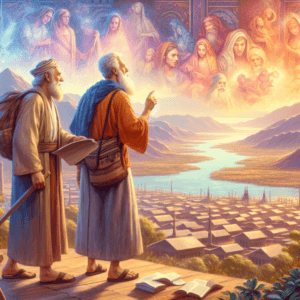 Apparently without hesitation, Abram sets out for Canaan (Genesis 12:5).
Apparently without hesitation, Abram sets out for Canaan (Genesis 12:5).
This trip is the start of a nomadic existence, with Abram moving his family members, servants, and livestock stock from place to place while receiving no specific indication from God that the land through which he travels will belong to him in his own lifetime.
The author of Hebrews refers to Abraham (Abram’s later name) as a model of faithfulness because he departed without knowing where he was going and lived as an alien in a land not his own (Hebrews 11:8–10).
In the previous three verses, God gave Abram a command and a set of powerful, astonishing promises. Abram was to leave his home behind and go to a place God would show him.
Pointedly, Abram is told both to “go from” his old life and culture, and “go to” a new land and a new future. In the going, Abram would receive unimaginable blessings from God.
However Abram responded to these words from God, it would be an act dependent on Abram’s faith. Either he would trust God or he would not. As it turns out, Abram went.
At the age of 75, Abram leaves his country, his people, and his home and heads toward whatever God has in store for him. He trusts God, which is the essence of the Bible’s depiction of faith (Psalm 31:6; 1 Peter 2:6; 2 Corinthians 3:4).
Interestingly, Abram will later fail to express this faith, leading to controversy. However, after being renamed Abraham, he will perform one of the greatest acts of trust recorded in Scripture (Genesis 22; Hebrews 11:17–19).
Among those Abram takes with him are his wife, Sarai, and his late brother’s son, Lot.
Genesis 12:5
And Abram took Sarai his wife, and Lot his brother’s son, and all their substance that they had gathered, and the souls that they had gotten in Haran; and they went forth to go into the land of Canaan; and into the land of Canaan they came.
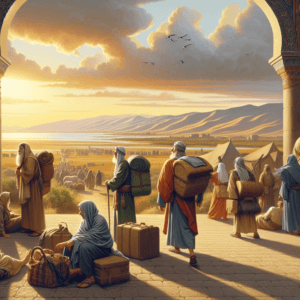 Abram took Sarai, his wife, and that was all right, of course. “And Lot his brother’s son, and all their substance that they had gathered, and the souls that they had gotten in Haran.”
Abram took Sarai, his wife, and that was all right, of course. “And Lot his brother’s son, and all their substance that they had gathered, and the souls that they had gotten in Haran.”
The time Abram had spent in Haran was a period of just marking time and of delaying the blessing of God.
God never appeared to him again until he had moved into the land of Palestine, until he had separated at least from his closer relatives and brought only Lot with him.
God called Abram to leave his country, people, and father’s household to go to a new country. But God does not just call Abram to “go from” his old life. The Lord also instructs Abram to “go to” a new land, and a new future.
As part of this command, God also gave Abram great and powerful promises: to bless him and make of him a great nation. This moment in history marks the foundations for God’s relationship with the nation of Israel, His chosen people.
Abram believed God and obeyed. He went. This verse shows us what a wealthy man Abram was. He and Sarai had possessions and servants acquired during their time in Haran. They took those with them to the Canaan.
Abram also brought along his late brother’s son Lot (Genesis 11:27). The two had apparently become close. Lot had no living father (Genesis 11:28), and Abram had no children. Their relationship will play a significant role in the following chapters.
“And into the land of Canaan they came”—now verse 6:
Genesis 12:6
And Abram passed through the land unto the place of Sichem, unto the plain of Moreh. And the Canaanite was then in the land.
 Here is the record of the fact that the Canaanites were the descendants of Ham’s son Canaan. I want to add something very important right at this point.
Here is the record of the fact that the Canaanites were the descendants of Ham’s son Canaan. I want to add something very important right at this point.
A great many people think that Abram left a terrible place in Ur of the Chaldees and came to a land of corn and wine, a land of milk and honey, where everything was lovely.
They think that Abram really bettered his lot by coming to this land. Don’t you believe it. That is not what the Bible says. And through archaeology we know that Ur of the Chaldees had a very high civilization during this time.
In fact, Abram and Sarai might well have had a bathtub in their home! Ur was a great and prosperous city. Abram left all of that and came into the land of Canaan, “and the Canaanite was then in the land.”
The Canaanite was not civilized; he was a barbarian and a heathen, if there ever was one. Abram’s purpose in coming to Canaan was certainly not to better his lot. He came in obedience to God’s command.
God called Abram to leave his home behind, and go to a land God would show to him. God also gave Abram great and powerful promises that He would bless him and make him a great nation.
Abram believed God and went. He entered the land of Canaan, which would become the Promised Land (Genesis 12:7).
He traveled across it, perhaps walking along the shore of the Sea of Galilee on his way to a town called Shechem. Joshua 20:7 describes Shechem as being “in the hill country of Ephraim,” roughly in the center of the land.
In Shechem, Abram goes to a tree called the oak of Moreh. The Hebrew term moreh means “teacher.” It’s possible this tree was in an oak grove used by the Canaanites in their religious cults.
It was a common practice of these cults to use nature, including trees, to seek messages from their gods. Perhaps Abram came to this place hoping to hear from the Lord. That’s what will happen in the following verse.
The verse reminds us that the Canaanites possessed the land at this time.
Now he has obeyed, and notice what happens—
Genesis 12:7
And the LORD appeared unto Abram, and said, Unto thy seed will I give this land: and there builded he an altar unto the LORD, who appeared unto him.
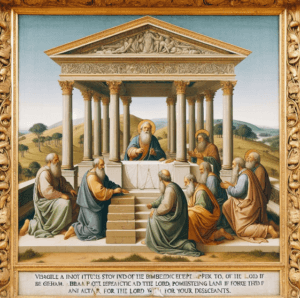 Abram builds an altar unto the Lord when He appears to him this second time. While he was in Haran, the place of delay, God had not appeared to him.
Abram builds an altar unto the Lord when He appears to him this second time. While he was in Haran, the place of delay, God had not appeared to him.
You see, one of the reasons that you and I are not always blessed in the reading of the Bible is because the Bible condemns—we are not living up to the light which God has already given to us.
If we would obey God, then more blessing would come. We see in Abram’s experience that God did not appear again to him until after he had moved out and had begun to obey God on the light that he had.
Now God appears to him again. Then Abram builds an altar, and we will see that he is a real altar-builder.
Abram believed God’s promises to him (Genesis 12:1–3). He obeyed God’s call to leave his home and travel to another land (Genesis 12:1–5).
Now, after Abram and his large contingent have traveled to the heart of the land of Canaan, the Lord appears to him.
This is apparently a different experience than when God spoke to Abram in verse 1. The Lord “appears.” We are not told what form He took.
The Lord is called Yahweh, and the term used for when Yahweh physically appears to people is theophany. This is the first of several theophanies made to the fathers of Israel.
Yahweh brings a short, specific promise for Abram: I will give this land to your descendants. This is the first time God has promised the land of Canaan to the people who will become Israel.
After leaving his old life, and his old culture, Abram was now home. Abram himself would not take possession of the land in his own lifetime, however. Even his descendants will not fully possess the land for several generations.
But the promise had been made by God. It would happen.
Abram responded in the way that many people in Scripture do after being visited by the Lord. He built an altar. He may well have made an animal sacrifice, though that is not mentioned.
It’s possible that Abram’s altar at Shechem stood as a reminder of this visit from the Lord for many years to come.
Genesis 12:8
And he removed from thence unto a mountain on the east of Beth–el, and pitched his tent, having Beth–el on the west, and Hai on the east: and there he builded an altar unto the LORD, and called upon the name of the LORD.
 Abram does two things when he gets into the land. He pitches his tent—that is like buying a home in a new subdivision and moving in. He “pitched his tent”—that’s where he lived. Then “he builded an altar.”
Abram does two things when he gets into the land. He pitches his tent—that is like buying a home in a new subdivision and moving in. He “pitched his tent”—that’s where he lived. Then “he builded an altar.”
That was his testimony to God, and everywhere Abram went, he left a testimony to God.
My friend, what kind of a testimony do you have?
To have a testimony, you don’t need to leave tracts in front of your house and you don’t have to have a “Jesus Saves” bumper sticker on your car (then drive like a maniac down the freeway, as some folks do).
That is no testimony at all. May I say to you that Abram quietly worshiped God, and the Canaanites soon learned that he was a man who worshiped the Lord God.
After the Lord appeared to Abram at Shechem and promised to give the land to Abram’s descendants, Abram and his large company moved on to the region between Bethel and Ai.
We’re told Abram “pitched his tent” there. This phrasing seems to imply that Abram and his people settled there for some time.
Also while east of Bethel, Abram builds an altar to the Lord and calls on His name there. The implication here may be that Abram began to participate in regular, formal worship of Yahweh in this place.
The terminology is similar to that of Genesis chapter 4, where people are said to begin to “call upon the name of the Lord” after the banishment of Cain, and the birth of Seth (Genesis 4:26). As with the altar at Shechem, no mention is made of animal sacrifices.
Genesis 13:4 records that Abram later returned to this altar and called on the Lord’s name again. This strongly suggests this altar was a lasting structure and not merely a temporary arrangement.
Genesis 12:9
And Abram journeyed, going on still toward the south.
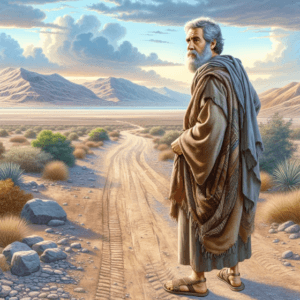 South is the right direction to go for warmer weather; so this man is moving south. He has itchy feet. He’s a nomad. Now we come to the blot in his life, actually the second one.
South is the right direction to go for warmer weather; so this man is moving south. He has itchy feet. He’s a nomad. Now we come to the blot in his life, actually the second one.
After the Lord appeared to Abram at Shechem, he and his large company moved through Bethel and may have settled there for a time. The reference to “pitching his tent” is most likely an indication that he stayed for some length of time.
Here, in this verse, Abram and his entourage move on again, heading farther south in the land of Canaan toward the region of the Negeb. The Negeb was a dry, desert area.
Without extensive cultivation, the land there could not support crops. At that time, the region was sparsely populated, and so it was not a good source for food or resources.
It may be that Abram and his large group of people and animals had to keep moving away from the more populated areas to find a place to settle down, though we are not told so explicitly.
In any case, Abram has now journeyed across much of the land which God has promised to his offspring (Genesis 12:7). He has both lived and worshiped God in significant places.
In one sense, Abram had already begun to take some ownership of the land God would give to his descendants.
I hope that you have really enjoyed this post,
Please Leave All Comments in the Comment Box Below ↓

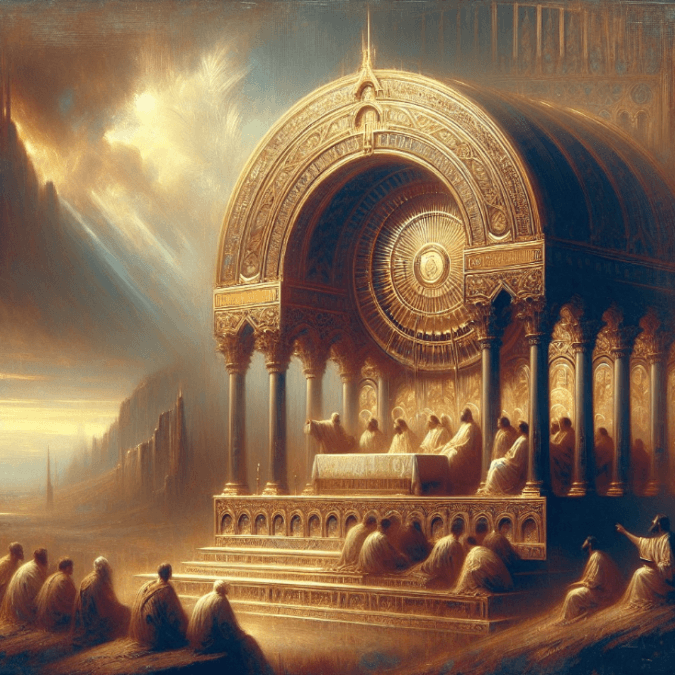











The article “Abraham’s Response” by God in Our Lives Everyday delves into the biblical story of Abraham and his profound response to God’s calling.
It explores the faith, obedience, and trust displayed by Abraham as he embarked on a journey of sacrifice and devotion.
I found this article to be a deeply insightful and inspirational reflection on Abraham’s unwavering faith and his willingness to submit to God’s will. You beautifully captured the essence of Abraham’s response, highlighting the profound trust he had in God’s guidance and promises.
“Abraham’s Response” is a thought-provoking and spiritually uplifting article that invites readers to reflect on the faith and obedience displayed by Abraham.
It serves as a powerful reminder of the transformative power of trusting in God’s guidance and following His call in our own lives.
Hello Pasindu,
I hope all is well with you.
Thank you for your continued participation and interest in the HBS & DwJ website. It is a real pleasure to have returning visitors such as yourself.
Thank you so much for your comments, and your continuous input on each episode.
Blessings My Friend!
Wow, this is such an inspiring post about Abraham’s faithfulness to God’s call.
It’s amazing how he trusted God and obeyed His command to leave his home behind and go to a new land. I found it interesting that God didn’t just call Abram to “go from” his old life, but also to “go to” a new land and a new future.
Have you ever felt like God was calling you to do something?
How did you respond?
Let’s learn from Abraham’s example and trust in God’s plan for our lives.
Hi Israel,
Thank you for stopping by, reading, and taking the time to comment on another Holy Bible Study session, turned HBS & DwJ Podcast episode.
In 2019, I felt like God was calling me to do more with spreading the Good News. I responded by creating this website, which lead to me creating the podcast, which lead to me creating the online store.
To GOD Goes The Glory!
Blessings My Friend!
What an enlightening analysis of Genesis 12!
This biblical passage holds significant insights that continue to resonate with us today.
It’s fascinating to see how God’s Call to Abram marked the beginning of a remarkable journey, one that would shape the course of history. The courage and obedience displayed by Abram in responding to God’s call are truly inspiring. His willingness to leave behind his familiar surroundings, family, and homeland demonstrates the level of faith and trust he had in the divine plan.
Furthermore, the events described in Genesis 12:4-9 reveal the profound and timeless significance of God’s promises to Abram. As we delve into these verses, we witness the unfolding of God’s covenant and blessings, not only for Abram and his descendants but also for all the nations they encounter on their journey.
Abram’s obedience to God’s Call is evident as he sets out for the land of Canaan, showing us the importance of trusting in divine guidance. Along the way, we see God’s constant presence and protection, guiding Abram through various challenges and obstacles.
The encounter with the Canaanites in verse 6 highlights the unique relationship between God and Abram, as God reaffirms the promise of the land to Abram’s offspring. This momentous interaction emphasizes the significance of God’s covenant and its far-reaching implications for humanity.
As we reflect on Abram’s faith journey described in these verses, we are reminded of the faithfulness of God in fulfilling His promises. It inspires us to trust in God’s plan for our lives and encourages us to embrace obedience even when faced with uncertainties.
Thank you for shedding light on the profound lessons from Genesis 12:4-9. Your analysis deepens our appreciation for the timeless wisdom and relevance of the scriptures.
I eagerly await more captivating insights from your future posts!
Hello Sandro,
Welcome to the HBS & DwJ Platform, and thanks for taking the time to stop by and comment on this HBS & DwJ Podcast episode, as well as considering it an enlightening analysis of Genesis 12.
I appreciate you appreciating this episode enough to eagerly await more captivating insights from future posts. Thank you so much for your educational and inspirational comments, they add value to the information that is already here. Spiritual Growth is what this platform is all about.
You are welcome for the shedding of light on the profound lessons from Genesis 12:4-9. I am very thankful that you recieve this study as an encouraging, deeper understanding of the biblical text.
Feel free to listen to the HBS & DwJ Podcast on iHeart, Apple Podcast, YouTube, or where-ever you get your podcast.
Blessings To You My Friend!
Given my limited knowledge about this topic, I’m quite fascinated by the story of Abraham and his journey.
It seems like there’s a lot of significance placed on his obedience to God’s command to leave his home and travel to a new land. One thing I’m curious about is the mention of Abraham taking his father and some family members with him, even though God had told him not to.
I wonder why God wanted him to leave his relatives behind and what impact it had on Abraham’s journey and relationship with God?
It also seems like Abraham’s move wasn’t just about physical relocation but also a spiritual transformation.
How did his obedience and faith evolve as he continued on this journey?
Hello again skamalka,
Thanks for continuing to stop by the HBS & DwJ website, turned podcast to comment on additional episodes.
The life of Abraham illustrates the journey of faith. On the journey, he experiences detours where his faith weakens, disputes with relatives and neighbors, and discouragements in his attempts to have an heir.
Through it all he grows in faith and receives the title “friend of God”. His journey can serve as a dynamic example for us.
We cannot fully understand the Bible without considering Abraham. The story of Abraham contains the first mention of justification by faith (Gen 15:6).
Please feel free to continue to stop by and share your thoughts on other information on this HBS & DwJ website anytime, your perspective is definitely welcomed.
Blessings My Friend!
The account of Abraham’s response to God’s call in Genesis 12 is a remarkable demonstration of faith and obedience.
Despite leaving behind a prosperous life in Ur of the Chaldees, Abraham chose to obey God’s command to go to an unknown land. This act of faith laid the foundation for God’s covenant with him and his descendants.
The article highlights Abraham’s journey, his altar-building as a testimony to God, and his continued trust in God’s promises. It emphasizes how Abraham’s obedience and worship paved the way for God’s appearances and blessings.
This narrative serves as an inspiring reminder of the importance of stepping out in faith, even when the path is uncertain, and how obedience and worship can lead to profound encounters with God.
Hello Ashley,
Thanks for taking the time to stop by this platform and comment on another HBS & DwJ Podcast episode.
I agree with you that this narrative serves as an inspiring reminder of the importance of stepping out in faith.
I am very thankful that you recieve this study as a remarkable demonstration of faith and obedience.
Please continue stopping by,
Blessings My Friend!